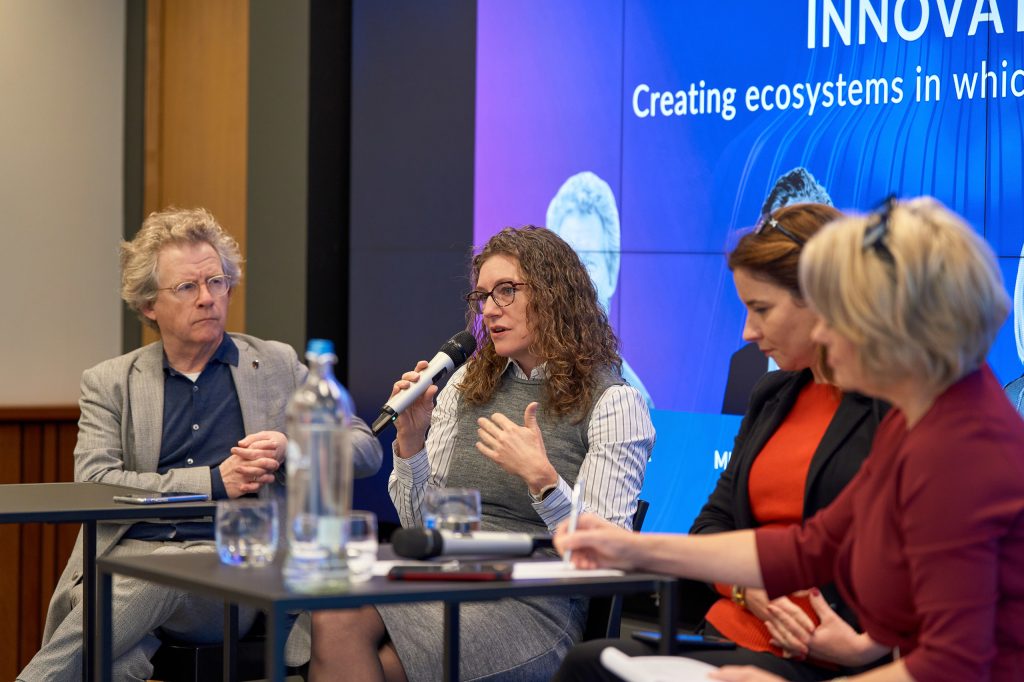How can emerging Europe’s firms increase productivity and competitiveness in a challenging economic environment?
In today’s challenging economic environment, companies throughout emerging Europe are faced with the pressing need to increase productivity and enhance their competitiveness. As the region navigates through various uncertainties and rapidly evolving market dynamics, the question arises: How can these firms thrive and stay ahead?
A key, pivotal aspect that demands immediate attention is the acceleration of digitalisation. With technology transforming industries and reshaping business landscapes worldwide, it is crucial for emerging Europe’s economies to prioritise digitalisation as a pathway to success. By embracing digital transformation, firms can harness the power of technology to streamline operations, drive innovation, and unlock new growth opportunities.
According to Michelle Simmons, General Manager Central Europe at Microsoft, digital transformation is an imperative.
“It’s not a ‘nice to have’ anymore. It’s a requirement for all businesses. But I’d say it’s only the start, it’s the foundation,” she said during a discussion focusing on productivity and competitiveness in Central and Eastern Europe at the Future of Emerging Europe Summit and Awards, held in Brussels on November 8.
Central to successful digital transformation is artificial intelligence (AI), believes Simmons, who says that the most successful businesses will be those that can leverage AI to empower their employees to make the firm as a whole more innovative and competitive.
“We know that when we look at our workplace trend index, that employees are tired, they’re exhausted. And what they find is that they no longer have the space for innovation, and creativity. And this is where artificial intelligence, even at the individual level, can really play a part,” said Simmons.
Agnieszka Gajewska is Global Government and Public Services Leader, CEE Clients and Markets Leader at PwC. During the discussion in Brussels she suggested that now was the time for Central and Eastern Europe to make the most of the opportunities presented by the wealth of innovation and creativity in the region.
“It’s a defining moment,” she said. “Our appetite for risk and entrepreneurship is going to define our economies.”
Gajewska was also keen to point out the progress that the region has made over the past three decades. “We are behind only the Asian Tigers when it comes to cumulative economic growth. Emerging Europe’s story is a great story,” she said, before warning against complacency.
“It’s great that we are doing well, despite the Covid-19 pandemic, despite Russia’s war on Ukraine, but we cannot forget that we are standing on a burning platform when it comes to some of the challenges facing our economies.”
AI as an enabler
The European Innovation Council was founded in 2017 to support the commercialisation of high-risk, high-impact technologies in the European Union. Its president, Michiel Scheffer, says that while it is only a “small actor” in the regional economy, it is nevertheless funding a lot of start-ups with AI either as an objective or as an enabler.
“We see AI as an important enabler, but it requires two things: deeptech start-ups and clients,” he said, adding that infrastructure would also have a role to play.
“AI requires advanced 5G connectivity, but it needs the educational infrastructure, places where start-ups, education, and research come together. And some of things require government investment.”
Indeed, the responsibility does not solely lie on the shoulders of firms themselves. Governments play a fundamental role in fostering an environment conducive to productivity, innovation, and societal progress. Through strategic policies and investments, governments can facilitate public and private innovation, enabling firms to adapt and flourish. By supporting research and development initiatives, promoting collaboration between academia and industry, and creating incentives for investment in emerging technologies, governments can act as catalysts for positive change.
Scheffer points to Poland, Slovakia and Czechia as countries in the region which have maintained an industrial skill base that will help them moving forward.
“Others have de-industrialised a lot, and now lack the ability to translate academic or high-tech knowledge onto the shop floor,” he said.

Michiel Scheffer, Michelle Simmons and Agnieszka Gajewska speak with the BBC’s Kasia Madera at the Emerging Europe Summit & Awards
Bending metal
This is now crucially important given the fact that, as PwC’s Agnieszka Gajewska puts it, emerging Europe is no longer cheap. “We can’t compete on price point with India,” she said.
“We need to find niches,” she added, “and we have our niches: entrepreneurship and great engineers. We are good at inventing. But these inventions needs support and we need to focus on the ecosystem—that’s where the conversation should be centered.”
Gajewska also said that one of CEE’s problems is that invention often gets mistaken for innovation. “Invention is about coming up with new ideas, innovation is about making these inventions commercially viable. This is why collectively the region needs to work bring universities and businesses together. It’s all about the ecosystem.”
According to Michelle Simmons, Microsoft’s focus is precisely on this issue of invention versus innovation.
“Our mission is to empower every individual organisation on the planet to achieve more,” she said. “It’s about how we make our technology available to the entire ecosystem to build on and innovate. It’s not about our product, it’s about what the ecosystem does with it. That’s where innovation comes to life.”
It comes back to Michiel Scheffer’s point about AI being an enabler, “and not a means in itself”.
“AI will not deliver fossil free energy, it will not deliver healthy ageing, but it might be used to help us bring those things about,” he said. “And that’s why we still need an industrial base: we still need people who know how to bend metal. AI only works if you understand the fundamentals behind it.”
Ultimately, the journey towards increased productivity and competitiveness in emerging Europe requires a multi-faceted approach. It necessitates not only the proactive efforts of businesses to embrace digitalisation but also the crucial involvement of governments in driving policy reforms and supporting innovation—notably in education and in forging relationships between universities and business.
Only by effectively addressing these intertwined challenges can emerging Europe’s firms navigate the complex economic landscape and position themselves for sustained success and societal progress.
Unlike many news and information platforms, Emerging Europe is free to read, and always will be. There is no paywall here. We are independent, not affiliated with nor representing any political party or business organisation. We want the very best for emerging Europe, nothing more, nothing less. Your support will help us continue to spread the word about this amazing region.
You can contribute here. Thank you.



Add Comment